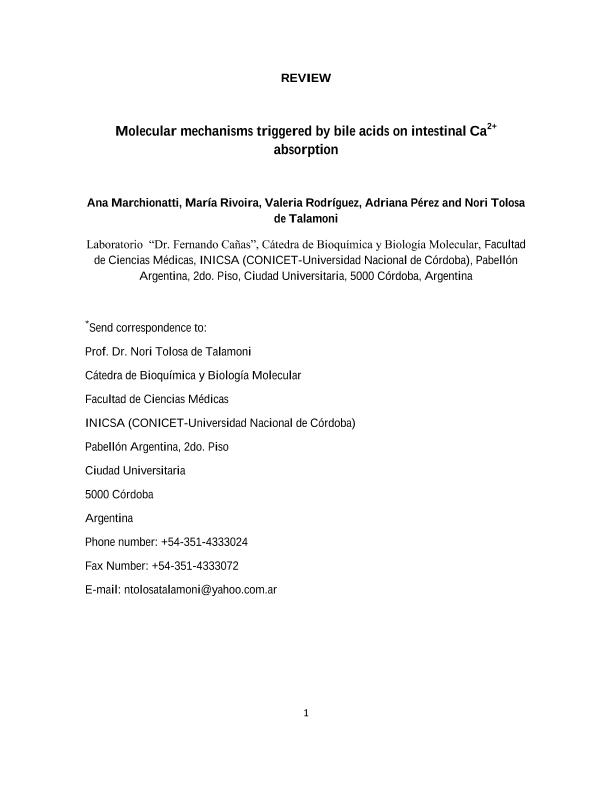Mostrar el registro sencillo del ítem
dc.contributor.author
Marchionatti, Ana María

dc.contributor.author
Rivoira, Maria Angelica

dc.contributor.author
Rodriguez, Valeria Andrea

dc.contributor.author
Perez, Adriana
dc.contributor.author
Tolosa, Nori Graciela

dc.date.available
2019-12-05T21:20:13Z
dc.date.issued
2018-10
dc.identifier.citation
Marchionatti, Ana María; Rivoira, Maria Angelica; Rodriguez, Valeria Andrea; Perez, Adriana; Tolosa, Nori Graciela; Molecular mechanisms triggered by bile acids on intestinal Ca2+absorption; Bentham Science Publishers; Current Medicinal Chemistry; 25; 18; 10-2018; 2122-2132
dc.identifier.issn
0929-8673
dc.identifier.uri
http://hdl.handle.net/11336/91559
dc.description.abstract
Background: Bile acids (BAs) are among the main components of bile. Lately, they are also considered important signaling molecules, not only by regulating their own synthesis, but also having a role in several metabolic diseases. Objective: In this review we focus on the effect of sodium deoxycholate (NaDOC), ursodeoxycholic (UDCA) and litocholic (LCA) acids and their combination upon the intestinal Ca2+ absorption. To make clear the actions of those BAs on this physiological process, an overview of current information about the mechanisms by which the intestinal Ca2+ occurs is described. Methods: The PubMed database was searched until 2017, using the keywords bile acids, NaDOC, UDCA and LCA and redox state, apoptosis, autophagy and intestinal Ca2+ absorption. Results: The modulation of redox state, apoptosis and autophagy are mechanisms that are involved in the action of BAs on intestinal Ca2+ absorption. Although the mechanisms are still not completely understood, we provide the latest knowledge regarding the effect of BAs on intestinal Ca2+ absorption. Conclusion: The response of the intestine to absorb Ca2+ is affected by BAs, but it is different according to the type and dose of BA. When there is a single administration, NaDOC has an inhibitory effect, UDCA is an stimulator whereas LCA does not have any influence. However, the combination of BAs modifies the response. Either UDCA or LCA protects the intestine against the oxidative injury caused by NaDOC by blocking the oxidative/nitrosative stress, apoptosis and autophagy.
dc.format
application/pdf
dc.language.iso
eng
dc.publisher
Bentham Science Publishers

dc.rights
info:eu-repo/semantics/openAccess
dc.rights.uri
https://creativecommons.org/licenses/by-nc-sa/2.5/ar/
dc.subject
APOPTOSIS
dc.subject
AUTOPHAGY
dc.subject
BILE ACIDS
dc.subject
INTESTINAL CA2+ ABSORPTION
dc.subject
LCA
dc.subject
NADOC
dc.subject
NITROSATIVE STRESS
dc.subject
OXIDATIVE STRESS
dc.subject
UDCA
dc.subject.classification
Bioquímica y Biología Molecular

dc.subject.classification
Medicina Básica

dc.subject.classification
CIENCIAS MÉDICAS Y DE LA SALUD

dc.title
Molecular mechanisms triggered by bile acids on intestinal Ca2+absorption
dc.type
info:eu-repo/semantics/article
dc.type
info:ar-repo/semantics/artículo
dc.type
info:eu-repo/semantics/publishedVersion
dc.date.updated
2019-10-22T16:41:50Z
dc.journal.volume
25
dc.journal.number
18
dc.journal.pagination
2122-2132
dc.journal.pais
Estados Unidos

dc.journal.ciudad
Oak Park
dc.description.fil
Fil: Marchionatti, Ana María. Consejo Nacional de Investigaciones Científicas y Técnicas. Centro Científico Tecnológico Conicet - Córdoba. Instituto de Investigaciones en Ciencias de la Salud. Universidad Nacional de Córdoba. Instituto de Investigaciones en Ciencias de la Salud; Argentina. Universidad Nacional de Córdoba. Facultad de Medicina. Cátedra de Bioquímica y Biología Molecular; Argentina
dc.description.fil
Fil: Rivoira, Maria Angelica. Consejo Nacional de Investigaciones Científicas y Técnicas. Centro Científico Tecnológico Conicet - Córdoba. Instituto de Investigaciones en Ciencias de la Salud. Universidad Nacional de Córdoba. Instituto de Investigaciones en Ciencias de la Salud; Argentina. Universidad Nacional de Córdoba. Facultad de Medicina. Cátedra de Bioquímica y Biología Molecular; Argentina
dc.description.fil
Fil: Rodriguez, Valeria Andrea. Consejo Nacional de Investigaciones Científicas y Técnicas. Centro Científico Tecnológico Conicet - Córdoba. Instituto de Investigaciones en Ciencias de la Salud. Universidad Nacional de Córdoba. Instituto de Investigaciones en Ciencias de la Salud; Argentina. Universidad Nacional de Córdoba. Facultad de Medicina. Cátedra de Bioquímica y Biología Molecular; Argentina
dc.description.fil
Fil: Perez, Adriana. Consejo Nacional de Investigaciones Científicas y Técnicas. Centro Científico Tecnológico Conicet - Córdoba. Instituto de Investigaciones en Ciencias de la Salud. Universidad Nacional de Córdoba. Instituto de Investigaciones en Ciencias de la Salud; Argentina. Universidad Nacional de Córdoba. Facultad de Medicina. Cátedra de Bioquímica y Biología Molecular; Argentina
dc.description.fil
Fil: Tolosa, Nori Graciela. Consejo Nacional de Investigaciones Científicas y Técnicas. Centro Científico Tecnológico Conicet - Córdoba. Instituto de Investigaciones en Ciencias de la Salud. Universidad Nacional de Córdoba. Instituto de Investigaciones en Ciencias de la Salud; Argentina. Universidad Nacional de Córdoba. Facultad de Medicina. Cátedra de Bioquímica y Biología Molecular; Argentina
dc.journal.title
Current Medicinal Chemistry

dc.relation.alternativeid
info:eu-repo/semantics/altIdentifier/doi/http://dx.doi.org/10.2174/0929867324666171116125131
Archivos asociados
